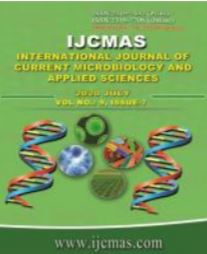


 National Academy of Agricultural Sciences (NAAS)
National Academy of Agricultural Sciences (NAAS)

|
PRINT ISSN : 2319-7692
Online ISSN : 2319-7706 Issues : 12 per year Publisher : Excellent Publishers Email : editorijcmas@gmail.com / submit@ijcmas.com Editor-in-chief: Dr.M.Prakash Index Copernicus ICV 2018: 95.39 NAAS RATING 2020: 5.38 |
Intestinal parasites are considered as a major public health problem worldwide especially in developing countries. An estimated 3.5 billion people are affected and approximately 450 million individuals currently suffer from these infections, and of which most of them constitute children. The two categories of pathogenic and non-pathogenic parasites which include Protozoa and helminthes are responsible for gastrointestinal tract ailments. The current study was aimed to determine the prevalence of intestinal parasitic infections (IPI) in patients suffering from diarrhoea. In this retrospective study, 1872 stool specimens examined from January 2018 to December 2018 by saline and iodine mount were included. The negative samples were further screened using formol ether concentration technique. 114 (16.1%) out of 1872 specimens were positive for parasitic infection. Giardia lamblia was detected in 64(56%) cases followed by Ascaris lumbricoides in 24(21%) cases, and H.nana in 18 (15.7%) cases. Prevalence was more in outpatient 90(79%) compared to inpatients 24(21%). More parasitic infections were seen in age group 0-15 years (106 cases) compared to > 15 years(8 cases) with a maximum parasite distribution in the age group of 6-10 years (64 cases). It was seen that the parasites responsible were seen both protozoa and helminths, with a predominance of the first. Improvement in sanitation, personal hygiene, access to health services, deworming programs in schools would act as some of the important contributors in decreasing the prevalence rates of IPI’s.
 |
 |
 |
 |
 |